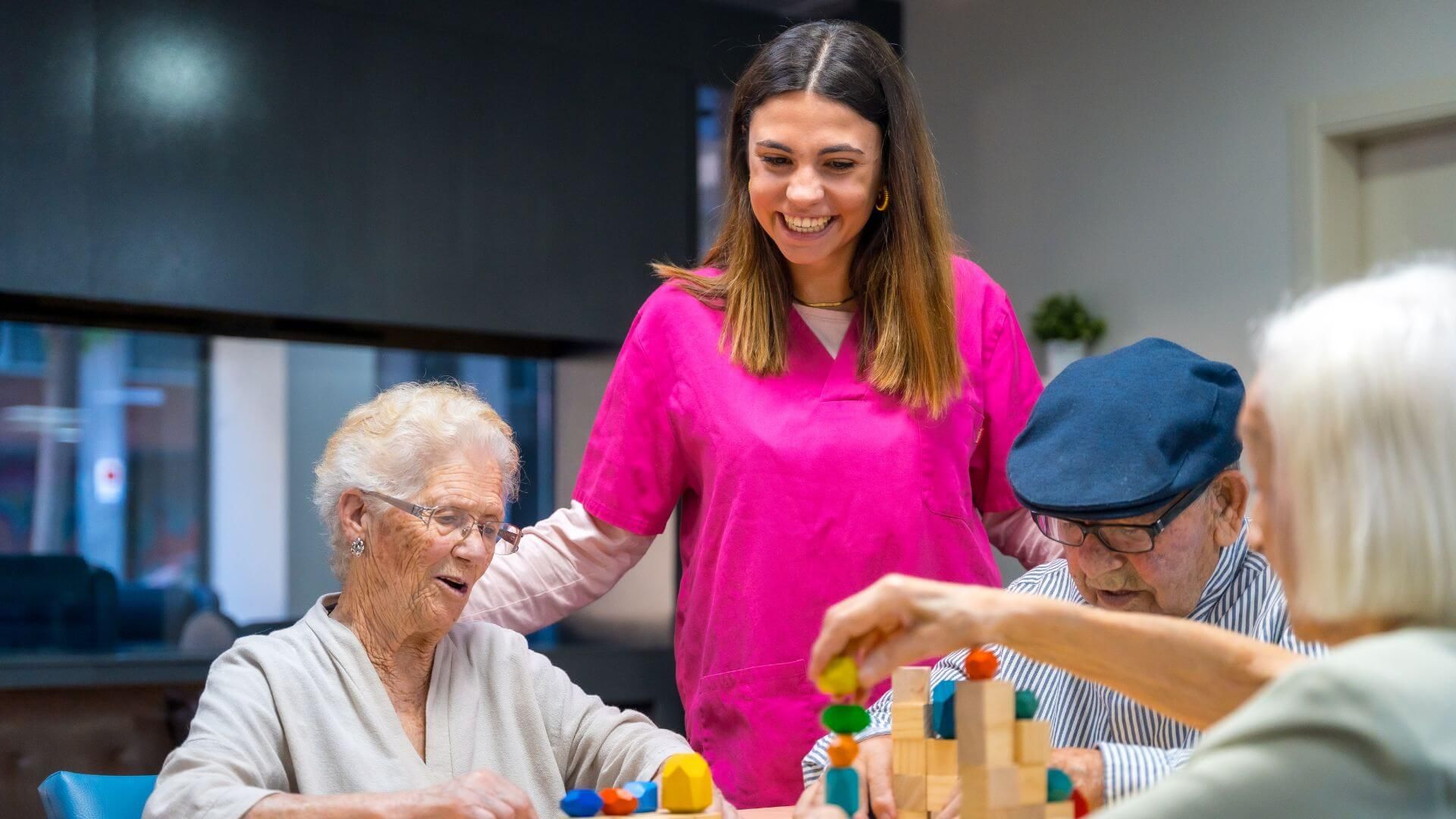When choosing a quality memory care facility, consider these key features for a supportive environment: a specialized program tailored to residents' needs, knowledgeable staff trained in dementia care, a secure environment with safety measures, opportunities for social engagement, support for family involvement, and comfortable living accommodations. These aspects help families make informed decisions that prioritize their loved one's needs and dignity.
Specialized Programs for Dementia and Alzheimer's Care

Specialized programs for dementia and Alzheimer's care are essential for creating a supportive environment that addresses the unique needs of memory care residents. Within assisted living facilities and memory care communities, these programs focus on enhancing the quality of life for individuals living with cognitive impairments.
Tailored Activities and Therapies
Many memory care units offer structured activities that promote cognitive engagement and physical activity. These programs can include reminiscence therapy, art classes, and music therapy, all designed to stimulate memory and encourage social interaction among dementia patients. Such activities help in reducing anxiety and fostering a sense of purpose.
Personalized Care Plans
Developing personalized care plans is a hallmark of effective memory care services. Health care providers in assisted living facilities collaborate with family members to ensure that each resident's program aligns with their preferences, abilities, and medical needs. This specialized care is crucial for addressing the challenges posed by Alzheimer's disease and other forms of dementia.
Family Involvement and Support
Recognizing the importance of family in the care process, many memory care communities extend support to family members. This may include educational programs to help them understand memory care costs, the progression of dementia, and ways to communicate effectively with their loved ones. Engaging families not only strengthens the care network but also ensures that memory care residents feel connected to their loved ones.
Comprehensive Medical Care
Most memory care communities prioritize comprehensive medical care, providing access to health care providers who specialize in memory-related conditions. Residents benefit from regular health assessments, medication management, and other necessary medical services within a safe environment. This approach not only alleviates the burden on family members but also promotes better health outcomes for those living in nursing homes or memory care units.
Overall, the right memory care community should offer a combination of tailored programs, supportive family involvement, and comprehensive medical care to ensure that residents receive the specialized care they need for a fulfilling life.
Staff Training and Expertise in Memory Care

The level of staff training and expertise in a memory care unit is crucial for delivering effective care tailored to individuals with cognitive impairments. Providing specialized training ensures that caregivers are equipped to handle the unique challenges that residents face as their disease progresses.
Importance of Ongoing Training
Ongoing education and training of staff in assisted living facilities focus on the latest best practices for dementia care and the specific needs of individuals in the early stages. This includes understanding communication techniques and behavioral management that align with the residents' conditions. Many memory care programs incorporate training modules developed in partnership with organizations like the Alzheimer's Association, ensuring caregivers stay informed about effective care strategies.
Staff to Resident Ratio
Another significant factor in determining the quality of care in memory care communities is the staff to resident ratio. Facilities that maintain a higher staff presence can provide more personalized attention, which is essential for ensuring the safety and comfort of residents during the various stages of dementia. Increased interaction greatly benefits family members as it means their loved ones receive adequate supervision and support, reducing the overall memory care cost associated with more severe incidents.
Specialized Skills for Diverse Needs
Training in skilled nursing care is also vital, particularly for facilities that cater to residents with varying levels of cognitive decline. Staff must be adept at recognizing the specific needs of veterans and utilizing veterans benefits effectively when catering to that population. In addition, facilities offering hospice care must ensure that staff are trained to provide compassionate support during the final stages of life, further enhancing the quality of care provided in nursing homes and residential care communities.
Insights from Families and Residents
The collaboration between trained staff and family members is essential for creating a harmonious environment in residential care facilities. Feedback from family members can help tailor care approaches to the residents' preferences, significantly improving the quality of life as they transition through the early stages and beyond. Whether residing in a private room or semi-private room, personalized care contributes to comfort and well-being, making memory care communities a reliable and supportive option for families seeking care for their loved ones.
Overall, the expertise of staff in the field of memory care plays a pivotal role in the success of care programs within assisted living communities and memory care facilities. These trained professionals are instrumental in implementing effective strategies to manage daily activities, creating supportive environments, and ensuring that the personal care needs of each resident are met. By emphasizing the importance of skilled staff, memory care can become a key aspect of families' decision-making processes as they seek the best options for their loved ones' well-being.
Safety and Security Measures in Memory Care Facilities

Ensuring the safety and security of residents in memory care facilities is paramount, especially for those experiencing early stage dementia. Facilities implement various strategies designed to protect vulnerable populations while promoting their independence and well-being.
Key Safety Features
Many memory care communities offer structural features that enhance safety, such as secure entrances and exits to prevent wandering, which is a significant concern among residents with cognitive impairments. Additionally, surveillance systems are often installed to monitor common areas, ensuring that family members can have peace of mind knowing that their loved ones are safe. Facilities typically employ a skilled nursing home care team trained to recognize signs of distress and respond promptly to emergencies.
Emergency Preparedness and Staff Training
Preparedness for emergencies is another crucial aspect of safety in residential care facilities. Staff undergo rigorous training in crisis management and emergency protocols, ensuring they can handle various situations should they arise. Regular drills are conducted to familiarize caregivers with procedures for fires, medical emergencies, or other incidents that may jeopardize resident safety.
Importance of a Calm Environment
Creating a calming environment is essential in memory care facilities offer a therapeutic setting that reduces agitation and confusion among residents. This includes designing spaces that minimize noise, incorporating sensory elements such as lighting and color, and ensuring that areas are well-organized and easy to navigate. This approach not only contributes to residents' emotional well-being but also decreases the likelihood of accidents or incidents that could occur in a disorienting environment.
Family Involvement in Safety Measures
Family members play a crucial role in reinforcing the safety of residents. Communication between staff and family is vital to ensure that all safety measures are aligned with the specific needs of each resident. Family members can provide insights into behavioral patterns and preferences that help staff create more personalized and effective safety protocols.
Comparing Safety Standards
When looking for the right residential memory care, it’s important to memory care compare different facilities based on their safety measures. Organizations like the National Institute and the National Investment Center provide resources and guidelines for families seeking insight into the standards of care and safety protocols in various memory care communities. Understanding what memory care covered in terms of safety can greatly influence families' decisions for their loved ones living with Alzheimer's and other dementias.
Through comprehensive safety measures and thoughtful facility design, memory care facilities aim to create supportive environments that help residents maintain their dignity while offering peace of mind to their families.
Opportunities for Social Engagement and Activities

Creating opportunities for social engagement is essential in memory care facilities, as it contributes significantly to the well-being of residents experiencing memory loss. A structured environment filled with various activities encourages interaction, cognitive stimulation, and a sense of belonging.
Engaging Everyday Activities
Memory care facilities often offer a range of engaging activities designed specifically for residents with cognitive impairment. These include art classes, music therapy, and brain games that challenge cognitive abilities while providing entertainment. Such activities not only entertain residents but also aid in improving mental acuity, which is vital in managing the effects of memory loss.
Involvement of Family Caregivers
Family caregivers play an integral role in the social engagement of their loved ones. Facilities frequently encourage family involvement in activities, allowing them to share meaningful moments with residents. Communication between staff members and family caregivers is essential to keep families informed about available activities and events, ensuring that they can participate in the same services offered to residents.
Focus on Nutrition and Wellness
Ensuring adequate nutrition is a crucial aspect of daily life for residents. Facilities often incorporate meal programs that promote healthy eating, alongside organized group meals that foster social interaction. Additionally, residents might benefit from speech therapy and other therapeutic sessions that engage them physically and socially, further enhancing their quality of life.
Comprehensive Support Systems
Many memory care communities also offer adult day centers which provide additional support for families. These centers allow families to focus on their responsibilities, knowing that their loved ones are receiving structured care and social activities throughout the day. Provisions for managing medication and scheduling medical appointments are streamlined, ensuring that both residents' health and wellbeing are prioritized.
Federal Government Resources
To aid families in navigating memory care options, the federal government provides various resources and information about available programs and support systems. This information is essential for families seeking to understand their options and the services available in memory care facilities, enabling them to make informed decisions for their loved ones.
Through a combination of structured environments and specially trained staff, memory care facilities aim to enhance social engagement while ensuring that each resident's individual needs are met, promoting dignity and comfort.
Family Involvement and Support Programs

Family involvement is a fundamental aspect of care in memory care facilities, where support programs are designed to help families pay attention to their loved one's needs while also managing their well-being. These programs foster collaboration between family members and staff, creating a cohesive support network for residents experiencing memory impairment.
Enhancing the Physical Environment
Involving families in the physical environment of the facility can significantly enhance the care experience. Family members can provide insights into their loved one's preferences and habits, which can influence design elements such as room layouts, color schemes, and communal spaces. When families can contribute to a familiar and comfortable setting, it can help mitigate anxiety and confusion, promoting a sense of reassurance for both residents and their families.
Meal Services and Nutrition
Meal services are another area where family involvement is vital. By encouraging families to partake in menu planning or to join residents for meals occasionally, facilities can create a pleasant dining experience that fosters social interaction. This not only adds a layer of enjoyment to meals but also supports the emotional and nutritional needs of residents. Families can learn about dietary preferences and needs, ensuring that meal services align with the unique requirements of each resident.
Behavior Management Strategies
Effective behavior management is another critical component of memory care support. Families can be involved in developing strategies that suit their loved ones' specific behavioral patterns, enabling staff to approach situations more effectively. Educating families on behavior management techniques ensures that they can reinforce positive behaviors at home as well, creating a consistent support system that benefits residents in both settings.
Creating Supportive Community Networks
Family support programs also focus on creating a wider community network that offers resources and emotional backing. This may include workshops, support groups, and educational sessions aimed at equipping families with the tools they need to navigate the challenges of memory impairment. By connecting families, facilities enable the sharing of experiences and advice, further enriching the care environment.
Engaging families through support programs enhances the quality of memory care provided in senior housing. By understanding and incorporating family insights regarding the physical environment, meal services, and behavior management, memory care facilities can create a nurturing atmosphere that benefits all parties involved.
Comfortable and Homelike Living Accommodations

Creating comfortable and homelike living accommodations within assisted living facilities and memory care units is essential for the well-being of dementia patients and those affected by Alzheimer's disease. A welcoming environment not only promotes a sense of comfort but also enhances the overall quality of life for residents.
Personalized Spaces
One key factor in developing a homelike atmosphere is the personalization of living spaces. Family members can contribute by bringing personal items such as photos and cherished belongings that reflect the resident's history and preferences. This personal care approach helps dementia patients feel more at ease, reducing feelings of confusion and anxiety associated with cognitive impairment.
Familiar Everyday Activities
Incorporating familiar everyday activities into the routine of residents living in nursing homes or residential care facilities can significantly enhance their comfort. Activities like cooking, gardening, or arts and crafts can be tailored to meet the individual capabilities of seniors, ensuring that they remain engaged and active. Staff members trained to understand the unique needs of residents can facilitate these activities in a way that is both enjoyable and beneficial.
Safe and Accessible Environments
Safety is paramount in creating comfortable living accommodations. A few factors to consider include ensuring that the layout of the facility is easy to navigate, with clear pathways and minimal obstacles. This is especially critical for those experiencing memory loss or cognitive challenges. Well-designed nursing homes should also address the physical needs of residents, providing accessible bathrooms and communal areas where seniors can safely interact.
Community and Connection
Fostering community connections within memory care units is vital. Regular social interactions assist in creating a supportive network, as residents form relationships not only with staff members but also with fellow residents. This sense of community is especially important for family members, who want to feel assured that their loved ones are thriving in a nurturing environment.
By focusing on comfort and a homelike atmosphere, assisted living and memory care facilities can significantly improve the lives of dementia patients, ensuring that each resident feels valued and cared for.
Personalized Care Plans Tailored to Individual Needs

Personalized care plans are essential in providing effective support for residents in senior housing, particularly for those experiencing memory loss. These tailored plans consider the unique preferences, behaviors, and medical needs of each individual, ensuring that care is not only effective but also respectful and empathetic.
Involvement of Family Members
Family members play a crucial role in the development of personalized care plans. Their insights into the loved one's history, preferences, and routine can help care providers create a more comprehensive approach. By collaborating with family members, staff can gain a deeper understanding of the resident's needs, ultimately leading to enhanced care within the memory care unit.
Specially Trained Staff
The successful implementation of personalized care plans relies heavily on specially trained staff who understand the complexities of memory care and dementia care. Staff must be well-versed in the unique challenges faced by those with Alzheimer's and other related disorders, allowing them to respond appropriately to various situations. Ongoing education and training ensure that caregivers are equipped with the latest knowledge and techniques endorsed by organizations like the Alzheimer's Association.
Regular Assessment and Adjustment
Personalized care plans are dynamic documents that require regular assessment and adjustment. As residents in assisted living facilities change and evolve, so do their needs. Care plans should be reviewed frequently to reflect any changes in condition, preferences, or behaviors. This adaptability ensures that each resident receives the best possible care, tailored specifically for them.
Empowering Residents
A core principle of personalized care plans is to empower residents by involving them in their care wherever possible. Encouraging individuals to express their preferences and participate in daily decisions fosters autonomy and dignity, which are vital components of quality care. By promoting this sense of control, the nursing home experience can be significantly improved for all residents.
Through personalized care plans, assisted living facilities can provide tailored support that respects and honors the individuality of each resident. This approach not only enhances the quality of life for seniors but also creates a comforting and nurturing environment where they can thrive despite the challenges of memory loss and dementia.
Contact Our Care Concierge

If you’re seeking a supportive and nurturing environment for your loved ones affected by dementia or Alzheimer's disease, look no further. Contact the Care Concierge of New England today to learn more about our tailored services and personalized care plans. Let us help you explore how we can enhance the quality of life for your family members in a home-like atmosphere. Reach out to us now to schedule a consultation and discover the difference compassionate care can make.


